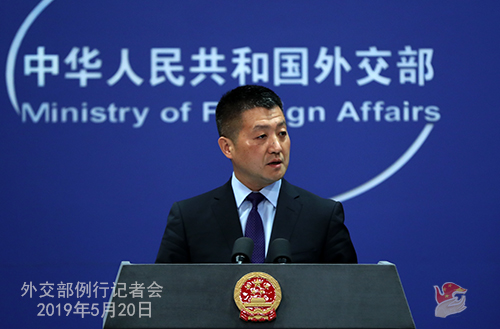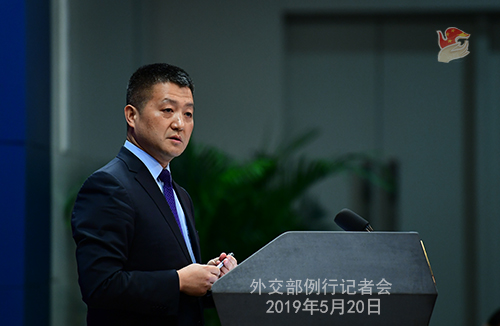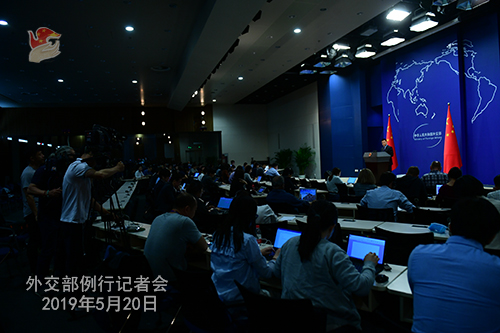| Foreign Ministry Spokesperson Lu Kang's Regular Press Conference on May 20, 2019 |
| 2019-05-20 23:14 |
|
At the invitation of Premier Li Keqiang, Prime Minister Charlot Salwai of the Republic of Vanuatu will pay an official visit to China from May 26 to 31. This will be the first official visit to China by Prime Minister Charlot Salwai since he took office. During the visit, President Xi Jinping will meet with him and Premier Li Keqiang will hold talks with him. The leaders of the two countries will exchange views on China-Vanuatu relations and important issues of mutual interest. Besides Beijing, Prime Minister Charlot Salwai will also visit Hainan and transit in Hong Kong. Vanuatu is an important country in the Pacific Islands region and a good friend and partner of China's. Since the establishment of diplomatic ties 37 years ago, the bilateral relations have made headway with fruitful outcomes in cooperation across the board. In November last year, President Xi Jinping held a successful meeting with Prime Minister Charlot Salwai in Papua New Guinea, and they agreed to elevate the bilateral relations to a comprehensive strategic partnership featuring mutual respect and common development, which opened up a new chapter in China-Vanuatu relations. Taking Prime Minister Charlot Salwai's visit as an opportunity, China stands ready to work with Vanuatu to enhance political mutual trust, expand practical cooperation, move forward China-Vanuatu comprehensive strategic partnership and bring more benefits to the two peoples. Q: Google has suspended some of its business with Huawei, apparently because of the new US government restrictions on Huawei. What is your response to this? A: We learned of the news that "Google has suspended business with Huawei" from media reports. We will verify the information and follow relevant developments closely. In the meantime, China supports Chinese enterprises in taking up legal weapons to defend their legitimate rights. Q: US President Trump said on the 17th that the two sides actually had a deal, but China broke it. What's your comment? A: I am not sure what "deal" the US side was referring to. Perhaps it has bore in mind all along "a deal" of its own wildwish, one that China has certainly not agreed on however. The underlying reason that the 11 rounds of consultations failed to yield an agreement is that the US attempts to achieve unreasonable demands through maximum pressure. This wouldn't work from the very beginning. When its threats didn't work and instead led to widespread doubts and market fluctuations at home and abroad, the US resorted to muddying the waters and shifting the blame. That, too, is futile as the international community bears witness to the sincere and constructive attitude China has shown in the past 11 rounds of negotiations. I would like to reiterate that there is hope for success only when the consultations proceed on the right track of mutual respect, equality and mutual benefit. Q: According to some German media, after years of review, the UK, Germany and the EU failed to find any backdoor in Huawei products. Security loopholes, however, have often been detected in US company Cisco's equipment, with 10 backdoor cases revealed since 2013. Would you like to comment on that? A: We would very much like to hear the US comments on this. Having said that, the international community probably wouldn't expect much for it, as the US has always kept silent on evidence-based accusations of its cyber attacks and cyber theft since the PRISM incident. Presuming other's behavior by one's own pattern, the US has been smearing foreign companies in an attempt to gain an unfair competitive advantage. But it has failed to produce any solid evidence. The findings of the European side you mentioned have proven Huawei's innocence and exposed the lack of legitimacy of the US suppression of foreign businesses with state power. Q: Assistant Foreign Minister Zhang Jun and Russian Deputy Foreign Minister Sergei Ryabkov held a new round of China-Russia consultation on strategic stability on May 17. Could you tell us more about the background, goal and topic of this consultation? Did they reach any consensus? What is Russia's view on the US attempt to promote the trilateral arms control negotiations? A: Regarding the latest round of China-Russia consultation on strategic stability, the Chinese side has issued a readout. I would like to stress some points: There have been growing instabilities and uncertainties in the field of international strategic security. Certain major country has withdrawn from one international treaty and mechanism after another while building up its own nuclear and missile power. This has severely undermined global stability, eroded strategic mutual trust between major countries and weakened international arms control mechanism, putting certain international and regional hotspot issues in the risk of being out of control. China and Russia both believe that they need to strengthen the planning of strategic cooperation, adhere to multilateralism, check the negative tendency and resist the harm of unilateralism, join efforts to address the challenges to the arms control and non-proliferation regime and step up strategic coordination on regional security hotspots. As to the trilateral negotiations on arms control, China's position is clear-cut. The premise and basis for trilateral arms control negotiations do not exist at all and China will never participate in them. Russia also believes that the US should continue to fulfill its due international obligations and it fully understands China's position on trilateral arms control negotiations. Q: The US ambassador is visiting Tibet, a trip that the US Embassy in China said was a chance to raise long-standing concerns about restrictions on religious freedoms and preservation of Tibetan culture and language. What is the foreign ministry's response to this trip? A: Ambassador Terry Branstad is welcome to visit Tibet and see for himself the enormous changes that have taken place in Tibet's socio-economic development and local people's work and life since the peaceful liberation of Tibet over 60 years ago, by which he may have a deeper understanding of the Tibetan Autonomous Region. As to the remarks from the US Embassy you mentioned, I would like to say that we hope Ambassador Branstad will visit Tibet with an objective attitude and the respect to facts and make his own unbiased observation, especially in terms of cultural preservation, religious belief and historical inheritance in Tibet. We hope the US side will come to a fact-based conclusion rather than being misled or disturbed by long-standing hearsay and rumors. Q: A US warship yesterday sailed near the Scarborough Shoal, or Huangyan Island. Did Chinese warships identify the ship and ask the US ship to leave? A: As far as I know, on the morning of May 20, USS Preble trespassed into the adjacent waters of Huangyan Dao without permission from the Chinese government. The Chinese Navy identified and verified the US warship according to law, and warned it off. I have to stress again that the trespass of US warship is a violation of China's sovereignty. It undermines peace, security and good order in the relevant waters. China firmly opposes such move. China has all along respected and protected the freedom of navigation and overflight in the South China Sea that countries are entitled to under international law. However, China is firmly opposed to actions that undermine its sovereignty and security under the pretext of "freedom of navigation and overflight". In disregard of the regional countries' shared aspiration for peace and stability in the South China Sea, the US has been disrupting regional peace and stability time and again under the pretext of "freedom of navigation and overflight". Such action is unpopular. We strongly urge the US to stop such provocation lest it should harm China-US relations and regional peace and stability. China will continue to take all necessary measures to defend national sovereignty and security, and safeguard peace and stability in the South China Sea.
Q: According to media reports, the Choson Sinbo, a newspaper run by the General Association of Korean Residents in Japan, carried an article saying that the US insistence on demanding the DPRK to denuclearize first led to the failure in reaching a deal at the Hanoi Summit. It is the position of the DPRK that only if the US gives up its selfish and arrogant approach to dialogue can consultations continue. What's your comment? A: We have noted relevant reports. It is China's consistent position that the Korean Peninsula issue can only be resolved peacefully through political dialogue. Steps must be taken in a phased and synchronized fashion as part of a package solution, starting with the easier tasks and advancing progressively. The key is to accommodate all parties' legitimate concerns in a balanced way. We hope the DPRK and the US could earnestly meet each other halfway, stay committed to dialogue for more outcomes and give peace a chance. China will continue to work with the international community to encourage both sides to keep moving toward the right direction of denuclearization and a peace regime on the Peninsula. Q: You said last week that China would take necessary measures to safeguard the rights of Huawei. Can you give us any indication or further decisions that have been made on that front, especially in light of this new information we have today about the blocking of access to Google products? A: You have understood China's position correctly. Like we said, the principle of mutual respect and equality and mutual benefit must be upheld in economic relations, trade and investment between countries. Q: Last week the Chinese foreign minister met with his Iranian counterpart. Did the two sides talk about the Iranian oil issue? Given that the US objects to other countries' import of Iranian oil, will China continue to import from Iran? A: I think you are referring to the meeting between State Councilor and Foreign Minister Wang Yi and the Iranian Foreign Minister Zarif in Beijing last Friday. We have released a detailed readout on that. You may see in it that the two sides discussed issues of mutual concern, including the latest developments on the Iranian issue. You mentioned that the US is disrupting other countries' oil import from Iran, in particular that the US has withdrawn from the JCPOA and been thwarting others' efforts to fulfill obligations under this agreement. China's position on that is very clear. The normal economic and trade relations between China and Iran are legitimate and lawful and should not be interrupted by anyone. Q: Just wanted to follow up on Tibet and the US ambassador. Last year the US ambassador's request to visit Tibet was rejected. I was wondering if you could share any details about why this trip was approved this year? A: As we said earlier, all those who seek to get an objective idea of the economic and social development of China, including the Tibetan Autonomous Region, are welcome to visit Tibet. I am not sure what you were referring to when you mentioned that his request was not approved. The visits to certain regions by foreign diplomats stationed in China, including the US ambassador, must be arranged after consultating with relevant departments. Q: The European Union Chamber of Commerce in China said today in a report that some European companies here are complaining about the issue of forced technology transfers. The Chinese government repeatedly promised to respect and protect the IPR. If it is serious, why are the European companies still encountering this problem in their operations in China? A: First, as you said, the Chinese government has repeatedly stated that we protect intellectual property rights and will never ask for the so-called forced technology transfer in cooperation between Chinese and foreign enterprises. I am sure you have also noticed that the recently-adopted Foreign Investment Law stipulates explicitly that there shall be no forced technology transfer through administrative means. In fact, China attaches great importance to the protection of intellectual property rights. There is never any policy forcing foreign actors to transfer technology. During different historical periods, there have been mutual investment and technology transfers between China and foreign countries, which is the result of consensual cooperation between market entities, a win-win cooperation by nature. Foreign companies, including European ones are as always welcome to take a ride with China to share its development opportunities through cooperation and realize win-win results. In the meantime, I have to stress that if European or other foreign businesses in China do have reasonable concerns for which they can provide solid evidence, I believe they can surely be resolved since we have clear legal provisions. That being said, we stand against fabricated complaints against us. Q: The Chinese leader visited Jiangxi and inspected the rare earth industry there. Against the background of China-US trade friction, what kind of message is the visit trying to send? Will China consider retaliating against the US by restricting export of rare earths? A: It's only normal for the Chinese leader to pay a domestic field trip and do research on relevant industrial policies. I hope you will not over-interpret that. As to the China-US economic and trade relations, just like I said earlier, they must be based on mutual respect, equality and mutual benefit. *** Today, the official account of the Foreign Ministry Spokesperson's Office is opened on Weibo. You are most welcome to follow it for more updates.
|
 |
|


